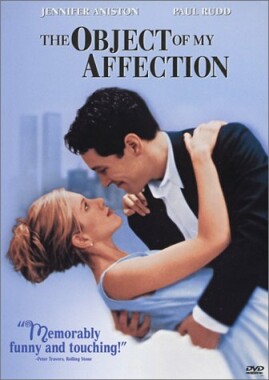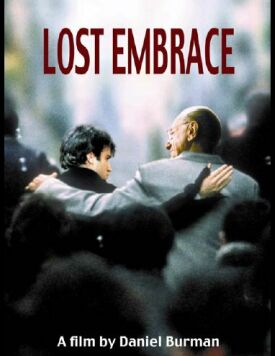Object of My Affection, The
The Object of My Affection, directed by Nicholas Hytner from a
screenplay by Wendy Wasserstein, strives briefly to rise above the level of
moral imbecility we have come to expect from most Hollywood comedies these days,
but alas does not succeed. The idea is that Nina Borowski (Jennifer Aniston), a
young social worker in New York, takes as her lodger in her apartment in
Brooklyn a gay schoolteacher, George Hanson (Paul Rudd) and finds herself
falling in love with him even though she has a boyfriend, a left-wing lawyer
called Vince (John Pankow) and in fact is soon pregnant by him. The attempt at
seriousness comes when Nina, sick of Vince’s boorishness, decides to kick him
out and raise the child with George, who is great with children and has a real
affection for her. Though somewhat doubtful, George is soon persuaded by her
conviction that “we can make this up for ourselves; none of the old rules
apply.” Except that well before the baby comes, we find that the old rules do
apply, at least in some sense.
So far so good. That is an irreducible minimum for seriousness and a
considerable advance on the usual Hollywood glibness, mirroring Nina’s own,
about ersatz happy families cobbled together out of gangs of friends and lovers.
Soon we find that George is picking up loose ends with an old lover, an absurd
Shavian scholar called Joly (Tim Daly) and then picking up other things with a
new lover, an impecunious actor called Paul (Arno Gulinello) who is the
protégé of yet another literary man, Professor Rodney Frasier
(Nigel Hawthorne). Nina finds herself getting jealous and possessive and
behaving like a nagging wife toward George, who is naturally as patient with her
as poor Rodney is with Paul.
All looks rather worrying if not tragic for a while, but soon everything
sorts itself out. Vince and George get along just fine once the baby is born;
George by that time is living with Paul who, nevertheless, continues to see
Rodney. Rodney, meanwhile, has become the sort of quasi-patriarchal rock on
which Nina, now living with an emphatically heterosexual black transit
policeman, has founded her ersatz family—rather improbably, I thought, for
a literary scholar. What does he find to talk about during the long hours he
seems to spend with this group of very un-intellectual yuppies? Mr Hawthorne, a
fine actor, may have been attracted to the role because it is potentially a good
joke to make him the one representative of a previous generation among these
brothers and sisters and lovers and friends. But if so the joke doesn’t really
come off.
For Nina, a social worker, has no use for parents, even of a comic kind. Her
social work, too, seems to consist of talking to teenage girls at the local
community center in a sisterly and obviously non-“judgmental” way about boys and
sex. However disappointed she is by George’s ultimate unsuitability as a
marriage partner, no lasting damage has been done. Maybe the old rules, if not
quite finito, can at least be bent to allow the yuppie princess, Nina, to accept
the devotion of all these men with the sexual attentions of only one of them.
Not a bad compromise you might think, if you are also a yuppie princess. Nina’s
new insight is that “You have to pick one person and make it work”—though
of course, having picked the transit policeman (to whom she is not
married), she finds that it works all by itself. And she gets to keep all the
other persons as well.
All the difficulties of reconciling feeling with family are raised only to be
dismissed, and feeling resumes its scarcely-interrupted sway as Nina’s little
girl reflects on how lucky she is to have so many wonderful uncles. I suppose it
is only what we should have expected, but one does resent that there isn’t at
least some comedy to beguile the time. Allison Janney plays Constance, Nina’s
step-sister and the spokesman for traditional notions of family and sexual
relationships, but she is not funny or even grotesque, only boring. Her marriage
to Sidney (Alan Alda), a big shot publisher, fails to produce anything much in
the way of laughs either, though it is obviously supposed to. The only good joke
to come out of Sidney is when, having entertained Nina at their place in the
Hamptons for the weekend, he congratulates her for deciding to go home after
only one day: “I hate the Hamptons,” he tells her. “They’re so pretentious.” At
least it would be a good joke if one did not have the sneaking suspicion that,
like Father Rodney, it might just be intended to be played straight.
Discover more from James Bowman
Subscribe to get the latest posts to your email.







